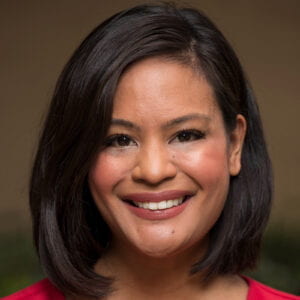Dr. Summer Zapata recently talked to us about perfectionism, college mental health, and quelling self-doubt. She recently accepted additional responsibilities as the new senior associate director of Counseling and Mental Health Services, USC Student Health.

In addition to her years of experience as a clinician, specifically working with the Health Sciences Campus population of students since 2018, Dr. Zapata is providing additional leadership in programs and services for student mental health across the campuses. She also previously served as the interim director of Relationship and Sexual Violence Prevention and Services, overseeing a specialized unit that promotes consent and prevention education, and provides direct services to survivors.
What are some of your observations from working with HSC students?
In the HSC campus programs, they’re a graduate population, so naturally most are older, and managing different issues than the undergraduates: managing work-life balance, clinical rotations, qualifying exams, working on their research and publishing, etc. HSC also has highly ranked programs in their professions, so there is a high sense of competition as well. We focus on balancing personal needs and stressors with academia.
Even with common topics like alcohol and substance, how it presents among grad students is different, you don’t see the binge drinking that is more common in the undergrad years. In graduate students the alcohol and substance issues are there and masked by more high-functioning behavior.
The pitfalls of perfectionism, the urgency and drive can be excessive, lead to burnout, and create a different kind of pain. Sometimes slowing down and doing the opposite of our natural urges can be helpful, so we can make informed choices.
Dr. Summer Zapata
In addition to working with the HSC population, you stepped in to lead RSVP on an interim basis, which is a really different practice. How has that influenced your approach to campus mental health topics?
Leading a specialized area like RSVP, it definitely helped having the institutional familiarity at USC, knowing the players at the table, the internal landscape, and the needs of the students. But there is a difference in subject matter specialty, and working with Debbie (Schleicher, who is now the permanent director in that role) and her team on the issues of sexual assault, domestic violence, and the specifics of that, I did learn quite a bit more. There are many nuances to these cases, and collaboration with third parties, and shared work with the students, is a huge piece of it. Ensuring trauma-informed practices, incorporating advocacy and prevention education with students — I learned a lot at RSVP, and Debbie did a lot of that work creating pathways that didn’t necessarily exist, so I learned a lot from her about the responsibilities in that area. Her team believe in creating social change at a really deep level, which is very powerful.
So I noticed that in your early years, you actually earned a CNA (certified nursing assistant) credential, which surprised me a little. Did you originally plan to follow the medical professional route?
Well actually, at that time, I had finished my undergrad early when I was still pretty young, and I was feeling a little nervous about my career choice — what if psychology didn’t work out for me? So, before I started grad school, I took the CNA training during the summer, which kind of came from my family, because there is a long line of RNs and MDs in my family, and my mom used to own a nursing home. My mom had encouraged me to think about pursuing it, so I volunteered, but this really just re-solidified that this wasn’t right for me.
That’s a pretty powerful personal “a-ha” moment!
Yes, and I’ve come to realize that’s part of the overachiever or workaholic mentality. When I was about the finish grad school, I thought about adding an MBA or JD, but now I see that overachieving can come from a place of fear or self-doubt; learning can happen in different ways other than academic, like doing direct work. I’d rather spend energy focusing on being courageous, and trying something now, pushing myself to try something different.
The pitfalls of perfectionism, the urgency and drive can be excessive, lead to burnout, and create a different kind of pain. Sometimes slowing down and doing the opposite of our natural urges can be helpful, so we can make informed choices.
College mental health is a pretty specialized area, and we talk about the constant need for attracting talent to the field. What do you say to practitioners who are considering working with college students? What makes this work rewarding?
Well, when we have postdocs and interns, they get a lived experience with the joys of this population, college students are in such a unique point in their journey, and we can have a real impact at an important time in their lives.
There’s also something powerful in being in a learning environment; the collaboration, the community, learning and growth opportunities, and a university environment provides great colleagues to learn from. It can be a very challenging job, no doubt, but having a great network of colleagues, and working with individuals from all over the world, make the job really fulfilling.
What do you enjoy about your work?
We have a really diverse team, which is a real asset. Some therapy is symptom reduction, but at a deeper level can be self-exploration, really diving into your identity, your values, and involve a lot of self-reflection and self-actualization. Other places may not have the same representative environment, and in taking this new role, when there are very few Filipinos in therapy, can bring a level of visibility and be very powerful for other people, and help reduce the stigma of seeking mental health care. These small things add up to a bigger impact over time.
